Content
- Possible reasons
- Brain concussion
- Myogelosis
- Osteochondrosis
- Arterial hypertension
- Cervical myositis
- Neuralgia
- Treatment methods
- NSAIDs
- Sedatives
- Massage
- Possible consequences and complications
- Video on nape pain and dizziness
Occipital pressure dizziness and general weakness are symptoms that significantly reduce the quality of life. These symptoms can be signs of a malfunction of many body systems, therefore, with the appearance and prolonged pain, it is recommended to consult a specialist and refuse self-medication.
Possible reasons
The back of the head is pressing and the head is dizzy - this is a fairly common problem that can be encountered when taking anamnesis. In most cases, these symptoms characterize impaired circulation or the functioning of the central nervous system.
Brain concussion
A concussion is a mild brain injury with a loss of consciousness for a short time. If you receive a brain injury, you must consult a doctor, since changes can be detected using special technologies at the subcellular level.
A concussion can be identified by the following symptoms:
- memory losses;
- dizziness;
- photophobia;
- increased sensitivity to noise;
- disruption of the vestibular apparatus;
- pain;
- nausea and vomiting;
- change in taste, as well as the perception of smell.
For a long time, a person may be bothered by an intense headache, reaching migraine.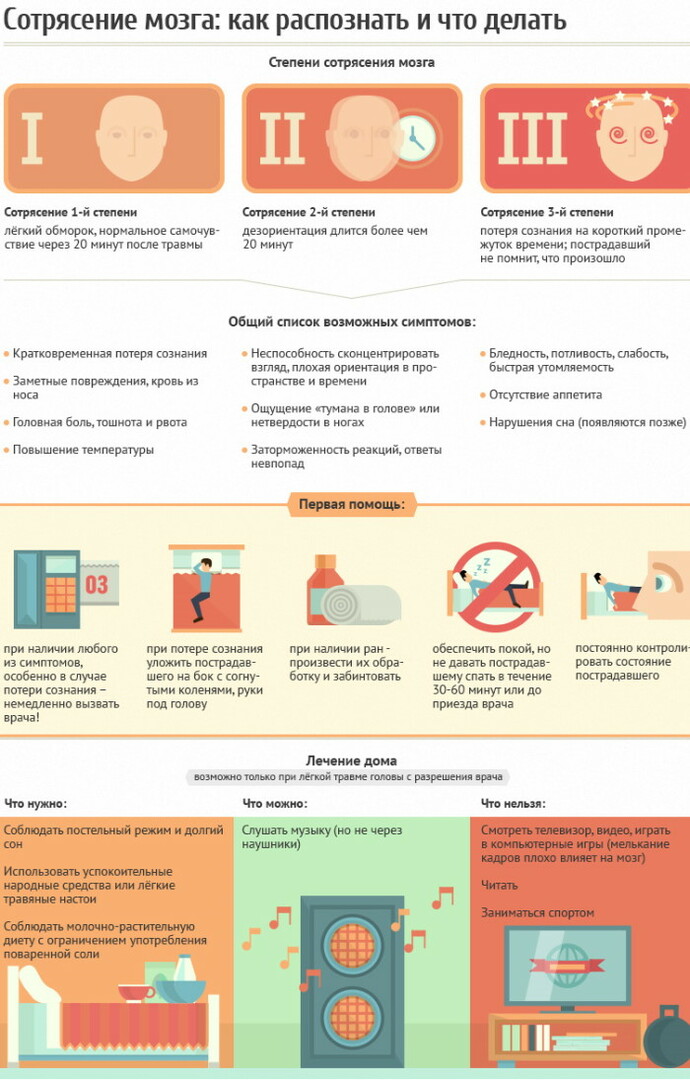
Concussion is caused by trauma. The nature of the origin of injuries can be anything from road accidents to sports injuries.
Myogelosis
Myogelosis of the cervical spine is a fairly common disease among people with a sedentary lifestyle.
Among the causes of the onset of the disease are also distinguished:
- posture disorders;
- prolonged stay in the wrong posture (for example, during sedentary work);
- being in a stressful environment for a long time;
- stay in a draft.
Exercise can also provoke myogelosis. If done incorrectly, the spine, neck and muscles can be affected.
Myogelosis can be determined by the following symptoms:
- severe muscle pain;
- headache and dizziness;
- stiffness in the movement of the shoulders and neck.
When these symptoms appear, it is recommended to see a doctor, as they can be caused by a lack of oxygen in the blood.
Osteochondrosis
Osteochondrosis of the cervical spine is a malfunction of the cartilage tissue, the process of its degradation and degeneration, as a result of which it is converted into bone tissue. There are several types and stages of osteochondrosis, which are characterized by increased symptoms and progression of the disease.
Among the common symptoms of cervical osteochondrosis are:
- pain in various parts of the body (most often in the neck with the passage to the occipital zone);
- headache and dizziness;
- decreased visual and auditory capabilities;
- general weakness (weakness in the upper limbs is especially acute) and drowsiness;
- Difficulty moving in the neck and shoulders - Difficulty turning the head.
You can often notice a crunch in the neck when turning the head - this is due to displacement of the discs and the appearance of new bone formations.
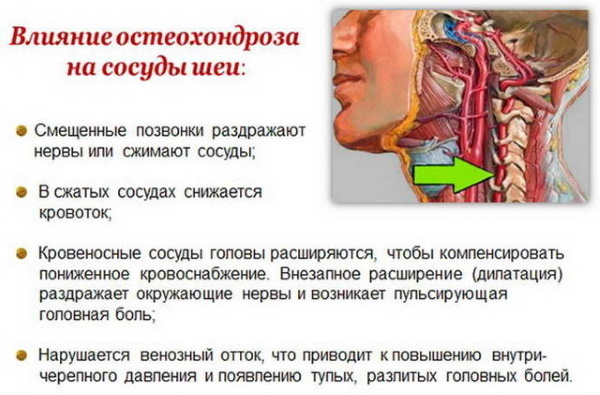
The causes of cervical osteochondrosis are:
- obesity;
- neck injuries;
- impaired metabolism;
- passive lifestyle;
- predisposition to this disease;
- diseases of the thyroid gland (diabetes mellitus, gout);
- autoimmune diseases (lupus, scleroderma, or rheumatoid arthritis).
Also, a factor in the development of the disease is constant and long-term stays in one position.
Arterial hypertension
Arterial hypertension is a common condition in which blood pressure exceeds 140 mm Hg. In the absence of an obvious reason for the appearance of this condition, hypertension can be diagnosed. If a disease or cause is identified, hypertension is a symptom or a secondary disease.
Pressing the back of the head and dizzy are the most common symptoms of hypertension.
You can also note other manifestations of high blood pressure:
- disruption of the visual apparatus;
- "Flies" before the eyes;
- increased heart rate;
- pain in the region of the heart;
- shortness of breath.
In frequent cases, hypertension may not manifest itself.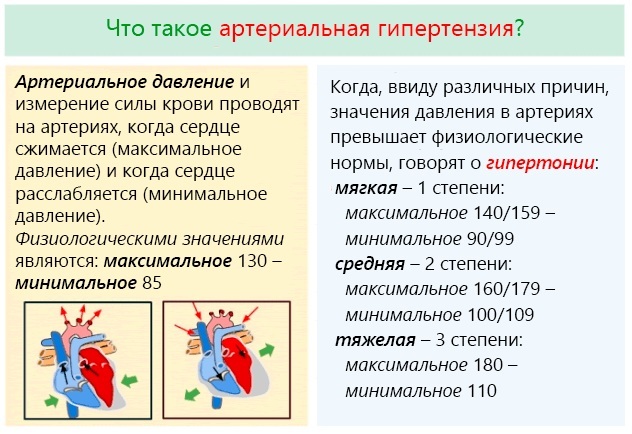
The causes of the disease are:
- stressful situations;
- diabetes;
- pathology of lipid metabolism;
- disturbed work of the nervous or hormonal systems;
- frequent alcohol intake, smoking, or obesity;
- hereditary predisposition;
- sedentary lifestyle.
About 45% of the adult population are susceptible to this condition.
Cervical myositis
Cervical myositis is a dangerous inflammatory disease that occurs in the neck. It occurs in people of any gender and age, and can be caused by common viral diseases.
Among the reasons for the development of the disease are noted:
- transfer of injuries of the cervical spine;
- excessive or insufficient physical activity;
- infectious diseases;
- infestation with parasites;
- systemic lesions of the connective tissue;
- purulent lesions in the neck.
At risk are people who are in one position for a long time or stressful situations.
Cervical myositis can be determined by the order of symptoms:
- pain in the back of the neck, turning into pressure in the occipital region;
- also the pain extends to the upper limbs, back area;
- slight swelling in the affected area;
- dizziness;
- muscle weakness;
- temperature increase;
- lack of appetite.
In this case, purulent myositis proceeds more acutely. With such a disease, you should immediately consult a doctor.
Neuralgia
Occipital neuralgia is associated with irritation of the nerve roots in the occipital region. Pathology significantly reduces the quality of human life due to constant pressure on this area.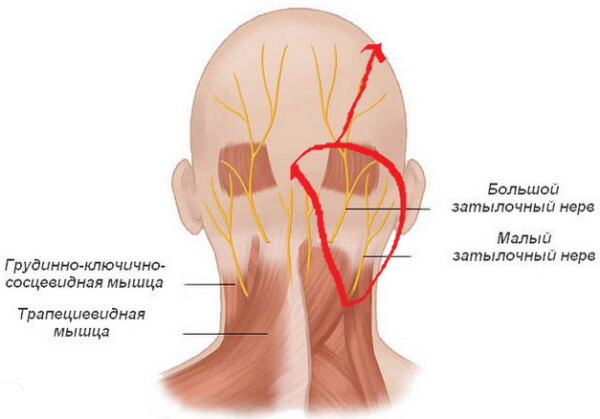
You can determine the pathology by the following symptoms:
- soreness, a feeling of squeezing in the occiput, temporal lobe, lower jaw;
- restriction of mobility in the neck;
- discoloration of the skin in the area of inflammation;
- hypersensitivity in the area of inflammation.
The attacks can last for 2-5 hours.
Treatment methods
Occipital pressure and dizziness can be controlled with certain groups of drugs. To relieve pain, it is recommended to use non-steroidal anti-inflammatory drugs. If stress is the cause of this condition, sedatives may be recommended.
NSAIDs
To relieve pain syndrome with pressure in the occipital region and dizziness, you can use the following drugs and remedies:
| Trade name | Method of application and course of treatment | Contraindications | Side effect |
| Aspirin | It is recommended to take no more than 3 tablets. per day The course of treatment with "Aspirin" should not exceed 10 days. | NSAIDs are not recommended for use in violation of the integrity of the mucous membrane of the stomach and intestines, bronchial asthma, cardiovascular disease and pregnancy. | The drug causes stomach pain and a decrease in the number of platelets in the blood. |
| Paracetamol | The drug is recommended to be used up to 4 times a day. with an interval of 4 hours. In this case, the course of treatment should not exceed 3 days. | The drug can cause allergic reactions, in rare cases - nausea and vomiting. | |
| Citramon | It is recommended to take 1-2 tablets during or after meals. in a day. You can repeat taking the drug after 4-6 hours. The maximum application dose is 8 tablets. per day It is not recommended to take the drug for more than 5 days. | The drug can cause an allergic reaction, as well as side effects typical for acetylsalicylic acid. | |
| Tempalgin | Apply 1 table. 1-2 times a day. The maximum daily dose of the drug is 4 tablets. | The drug can cause irregular heartbeats, low blood pressure and blue lips. | |
| Pentalgin | Per day it is not recommended to consume more than 4 tablets. The duration of treatment as an anesthetic is 5 days. | In rare cases, Pentalgin causes skin raw materials, anemia, anxiety and sleep disturbances. | |
| Ibuprofen | Take 3-4 tablets. per day. It is not recommended to consume more than 6 tablets. The course of drug treatment is 5 days. | When using the drug in recommended doses, side effects appear in isolated cases. Dyspeptic symptoms, insomnia, allergies are possible. | |
| Spazgan | It is recommended to take 1-2 tablets after meals. 2-3 times a day. The daily dose should not exceed 6 tablets. Long-term use (more than 7 days) should be supervised by a specialist. | In rare cases, anaphylactic shock, skin rash, dry mouth are possible. |
If the pain is caused by serious injury or malfunctioning of the nervous system, you should see a doctor. Potent pain relievers can only be obtained with a specialist prescription.
Sedatives
Pressing in the back of the head and dizzy from stress - taking sedatives is necessary. They will eliminate the cause, and the symptom can be removed with any pain reliever compatible with one or another sedative.
You can relieve stress using:
-
"Persen". A herbal remedy based on valerian, mint, lemon balm. The drug is indicated for increased excitability and irritability. A feature of the drug is the absence of a withdrawal syndrome after discontinuation of the drug. The maximum number of tables. per day is 12 units. It is not recommended to use the drug for more than 2 months;
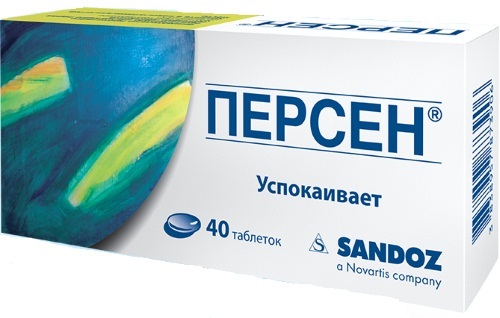
- "Novo-passit". Herbal sedative based on lemon balm, valerian and hawthorn. It is indicated for insomnia, neurasthenia, constant tension. It is recommended to use the drug inside, 3 times a day before meals;
- Tenoten. Combined preparation with a sedative effect. The remedy is indicated for stress disorders, lesions of the central nervous system. It is recommended to use 1-2 tables. 2 times a day. If necessary, you can increase the amount of the drug to 4 tablets. The course of treatment is 1-3 months.
You can also use herbal infusions as a mild sedative. For this, mint, lemon balm, thyme, linden, valerian are often used. Enough ½ tbsp. 3-4 times a day to get a mild effect.
Massage
You can get rid of headache and dizziness with massage.
Algorithm for performing the work:
- With clean, dry palms, stroke, knead the occipital region.
- Stroke from left to right and then backwards.
- Work out the lower part of the back of the head. Massage the neck muscles.
- Press on the dimples at the bottom of the back of the head. The first pressure may be painful, but the discomfort quickly goes away.
The correct "way out" of the massage is quite simple - you need to perform light stroking and pinching the skin.
Possible consequences and complications
Occipital pain and dizziness significantly reduce the quality of life. In the absence of treatment, the diseases that cause this condition can progress.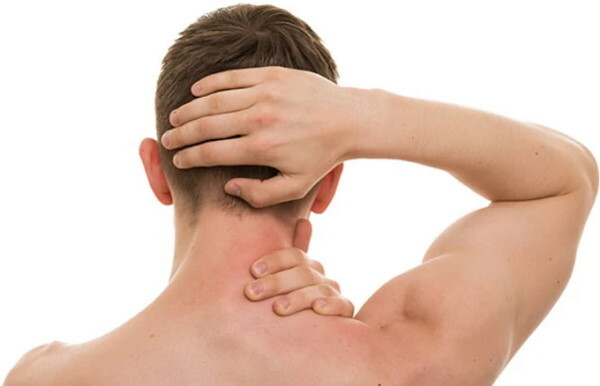
Possible complications:
- the most dangerous complication of hypertension is hypertensive crisis. The condition is characterized by a sudden rise in pressure, which is accompanied by pronounced symptoms;
- osteochondrosis of the cervical vertebra, if untreated, progresses, which can lead to a pinched nerve, impaired blood circulation or oxygen starvation;
- cervical myositis can become chronic. The pain becomes recurrent, manifests itself with little physical activity;
- occipital neuralgia, if left untreated, can lead to torticollis or loss of vision.
All diseases in the early stages can be treated or stopped.
Dizziness and headaches in the temples, occiput are a common condition that allows you to identify a number of diseases of the cardiovascular and central nervous systems. To determine the exact disease and start timely treatment, it is necessary to undergo diagnostics and, if symptoms appear, consult a specialist.
Video on nape pain and dizziness
The back of the head hurts. Dizziness. Vertebral artery syndrome:
